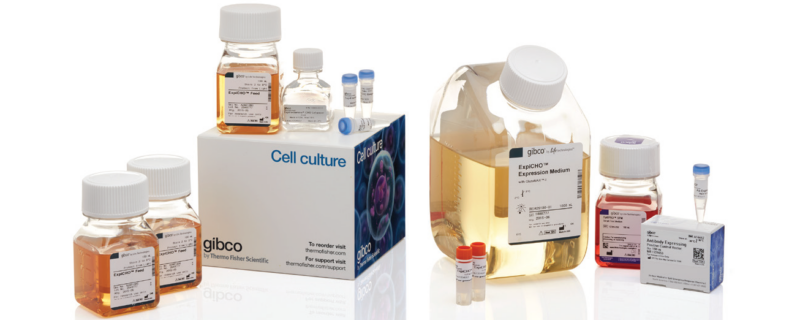
Celebrating 10+ Years of Innovation: Thermo Fisher Scientific’s Gibco Expi Protein Expression Systems
Company: Thermo Fisher Scientific, Inc.
Job Title: Sr. Global Market Development Manager
We had the privilege of sitting down with Sapna Padmanabhan, Sr. Global Market Development Manager at Thermo Fisher Scientific to talk about the Gibco™ Expi Protein Expression Systems, which have revolutionized protein production for over a decade. These optimized transient expression systems provide a high-performing alternative to conventional stable transfection methods. They enable high-yield, consistent protein production for many downstream applications, driving significant advancements in various research areas, such as biologics development, drug discovery, vaccine development, immunology, gene therapy, immunotherapy, and infectious disease research.
During our Q&A session, we will explore the history and significance of these systems, not only in driving innovation in the protein expression space but also in shaping the development of new products at Thermo Fisher Scientific.
Can you provide an overview of the Expi Protein Expression Systems?
The Expi protein expression systems are a suite of optimized, complete transient protein expression systems designed to enable high-level protein production in various cell lines. Stable transfection methods, which have historically been industry norm when large amounts of recombinant proteins are required, are time-consuming and researchers are often challenged by low expression levels, gene silencing, and gene instability. The Expi protein expression systems have gained recognition in the scientific community for their ability to deliver high protein yields, enhanced productivity, and scalability in a short timeframe (days vs. weeks or months).
Our flagship Gibco™ Expi293™ Expression System was introduced in 2012, which was optimized for transient expression of proteins from a mammalian HEK 293 cell line. It consists of a high-expressing 293 cell line, a chemically defined serum–free culture medium, and a high-efficiency transfection reagent with specialized enhancers. We’re proud to say it’s become the go-to choice across the industry for transient expression in mammalian 293 cells for more than a decade.
Following that, the market need for an optimized system approach for CHO cells became obvious. We launched the Gibco™ ExpiCHO™ Expression System in 2015, tailored for transient protein expression in Chinese hamster ovary (CHO) cells known for their ability to produce complex glycosylated proteins. With this system we moved the needle in protein yields from 10-20 mg/L (industry standard for CHO systems) to yields of grams per liter, a complex technical hurdle to overcome. We then expanded our range of optimized systems into the insect cell space in 2018, with the first chemically-defined baculovirus expression system, the Gibco™ ExpiSf™ Expression System, which leverages an Sf9 insect cell line.
What sets the Expi Expression Systems apart from other transient expression systems?
The Expi systems are unique in that the researcher has everything they need within the system. Our disruptive approach is an all-in-one platform where every component, including the cells, media, transfection reagents, and enhancers, was specifically designed and optimized to work together synergistically. For example, our current iteration of the Expi293 system generates up to 6x more protein in just one week compared with other transient 293 expression systems where it can take two weeks or more. We’re enabling researchers to produce more protein with less volume in less time—which is great news, not only from a productivity standpoint, but also from a sustainability standpoint in using less plasticware!
Not only that, but the Expi systems have been extensively validated by the scientific community over the years, and we’ve made this content available to researchers through our online publication hub. We hope it offers insight into how scientists are advancing their research with Expi protein expression systems.
How has the blueprint of the Expi Expression Systems influenced the development of other innovative products within the Gibco portfolio?
Thermo Fisher Scientific has established leadership in this space, and the pioneering concept of an “optimized system” consisting of cells, media, transfection reagent and other components has proven to be a game-changer and translated to other aspects of our business. Our in-house expertise coupled with the breadth of our portfolio offerings has given us the unique capability to create such systems.
Utilizing the same blueprint as the Expi Protein Expression Systems, we developed the Gibco™ LV-MAX™ Lentiviral Production System and Gibco™ AAV-MAX Helper Free AAV Production System. Both the RUO and CTS versions of the LV-MAX and AAV-MAX systems are complete systems containing optimized components to deliver high viral titers of lentivirus and adeno-associated virus, respectively. These systems have solidified our presence in the rapidly growing cell and gene therapy market over the last couple of years and we’re excited to continue innovating in this space.
Thermo Fisher Scientific has always been committed to delivering high-quality products and we remain a trusted partner to the scientific community through the provision of innovative solutions and powerful technologies that continue to drive scientific advancements across a wide range of disciplines and research areas.
We would like to express our appreciation to Sapna for generously sharing her expertise and insights on the Gibco Expi Expression Systems and their transformative impact across the industry and within the organization.
For more information on the Expi Expression Systems, please visit thermofisher.com/expi.